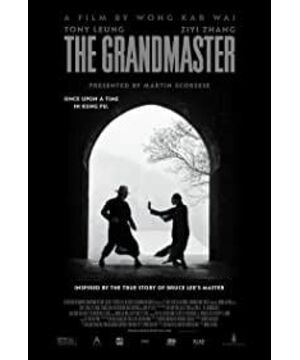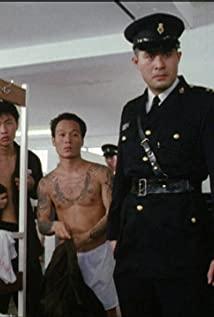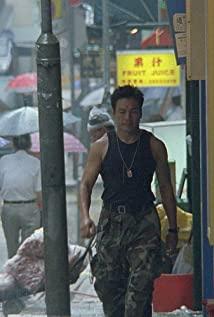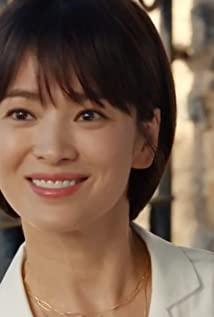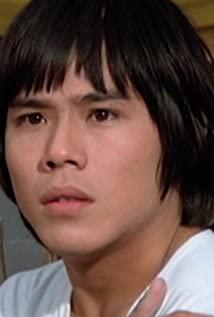Foreword: I have read some film reviews about this film, many of which pay attention to details, cite widely, and have extensive and informative annotations. Of course, it's a good thing that a movie, if within the effective range of your knowledge system, can generate an encyclopedia-style link interpretation that traces its origins by analogy. If the audience can have such a connection, it shows that the film itself has done its homework and is sincere. But often when ordinary audiences can't even understand the most basic and intuitive meanings expressed by the film, it is impossible to dig the depth of the film.
I believe that every creator will not be obscure for the sake of understanding. On the contrary, the emotions that they want to express urgently should be understood by everyone, but everyone will choose the way they prefer and are good at. It is best to have a strong personal imprint. So did Wong Kar Wai. Sometimes all it takes is a little guidance and a little more patience. For example, "The Matrix", as long as you can understand the concept of Matrix, you can basically understand it. Another example is "Mulholland Drive", if it can be analyzed in conjunction with Freud's "The Interpretation of Dreams", it will not think that the director does not understand. On the contrary, when you understand such a movie, it brings you several times the pleasure of watching a movie than an ordinary movie.
Hu Shi once said that the biggest disadvantage of my writing is the vernacular, and the biggest advantage is also the vernacular. Any creation can resonate only when others understand your thoughts. In my opinion, "The Grandmaster" is not a convoluted film, but in a poetic way. The so-called superficial explanation only takes its meaning and is only for reference by friends who do not understand the latter. A lot of exchanges, each expressing their own opinions.
[Introducing the old and bringing forth new generations of talented people]
{When the undefeated master Gong Baosen retired, a new person was chosen to take over. As the representative of the southern boxer, Ye Wen fought with Yi Yi, and if he won, he came forward. Gong Baosen suggested not to compete in martial arts, but in ideas. Ye Wen's words were astonishing, Gong Baosen sighed with humility, and Ye Wen gained his fame and became an instant hit. }
As always, Tony Leung kicks off the film with storytelling. The "focused and pure" impression he gives in his performances is characteristic of a consummate charismatic actor. Like Bogart, Newman, De Niro. The two most important sentences in my memory are, "Kung Fu, two words, one horizontal and one vertical..." and "A belt in one breath... can persevere with this sentence. ." This is the opening point.
The battle in the rainy night is outnumbered, the rhythm is slow, and the image is sharp. Obviously, it was the first time to give a candy to the audience who were looking forward to the fight scene. When the picture comes to the Golden Tower, the most worthy of telling stories in one's life unfolds. Why is it said that the Golden Tower is a place of ecstasy and a heroic place? According to the background information of the film, during the 1911 Revolution of 1911, Gong Baosen (played by Wang Qingxiang) participated in the murder of the then Guangzhou general Fengshan, and contributed to the overthrow of the Manchu Qing rule and the establishment of the Republic of China, while Jinlou was is their meeting room. Therefore, another identity of those who practice martial arts is a revolutionary party, and another name of Jinlou is "Republic Building". Therefore, when Gong Baosen, as the president of the Chinese Samurai Association, said, "Does boxing have a north and a south, and does the country have a north and a south?" , it is not surprising.
Gong Baosen said to Ding Lianshan (played by Zhao Benshan): "1905, the year of Otto, was the year of the snake, and you left the Northeast in that year." There was a major event in 1905, represented by Wu Yue and Zhang Rong." Ding Lianshan was one of the followers of the Northern Assassination Group to "assassinate the "Five Foreign Ministers" in order to overthrow the Manchu Qing rule. Ding Lianshan said: "Under the banner of the sun, can I accommodate this ghost"? Then he told the story of his desperation for beheading the Japanese bloodthirsty rogue group "Bo Wugui". Of course, these all belong to the seamless embedded processing made by the screenwriter based on the character prototype, just to make it more plump. The conversation between Ding Lianshan and Gong Baosen is not difficult to understand.
In the case that most audiences do not know the relevant historical background in the film clips, it is difficult to make connections and understand them by just one or two lines of the characters. This is not to say that you don't need to infiltrate these historical backgrounds, on the contrary, you need to make the audience feel strong and powerful overtones, leaving room for the audience's imagination. But there is a premise, you must first give the audience the simplest and most intuitive impression, that is, the initial judgment of the character's position. To talk about the character Ding Lianshan, the initial judgment of reading Jin Yong should be "sweeping holy monk", the initial judgment of playing Warcraft should be "shadow hunter", and the initial judgment of watching the early AV of the island country should be Jin with almost zero facial close-up. A gun can't kill the king (of course this sentence is a joke). In short, four words: "the world's masters". However, no matter how Uncle Benshan enters the play, no matter how he looks at it, he is still a big flicker in the trilogy of kidnappings, and laughter is inevitable.
Before the Great War of the Century, the Southern Boxing School specially prepared three congratulations for Ye Wen, which was very targeted and intended to remind him to be cautious, which could be regarded as a warm-up. The audience is also looking forward to a peak matchup, Real Madrid VS Barcelona, it should be the Lakers and the Thunder. But Gong Baosen, who obeyed the advice of his senior brother, had a different idea. The old man's words were righteous and awe-inspiring. However, Ye Wen always looked confident. Sure enough, not only did he break the cake, but he also spoke some great words. There is a good sentence "Dacheng is lacking", the words in the "Tao Te Ching" are quoted so appropriately, it is clearly a man who has gone beyond the distant mountains and broadened his horizons in the mouth of the old man. In the interval between the two arm wrestling and pushing Tai Chi, the film gives the audience a chance to empathize with the protagonist. If I were Ye Wen, how would I answer the old man's words? I remember I wanted to say at the time that there is no north or south in the country, your sister! I actually took this as a true or false question. Isn't this a person who is deeply hurt by the standard answers of exam-oriented education? Regardless of whether I am an honest person or not, the old man is considered to have chosen the right person, and said a sentence that clarifies the theme of the whole film: "Light a lamp in one breath, you must know that if you never forget, there will be echoes, and if there is a light, there will be someone. "Undertake the opening "One Belt in One Breath".
[As soon as I see it, Chisu does not forget the promise]
{In the battle of Jinlou, Gong Er showed sixty-four unique skills in front of Ye Wen, one of which was named: "Yeli Zanghua". Gong Er warned him, "There are mountains outside the mountains, and there are people outside the people. You can't just focus on the road in front of you, but look behind you." Ye Wen expressed that he hoped to witness the stunt "Sixty-Four Hands of the Gong Family" again in the future. Gong Er said "you come, I'll wait". Agreed. }
In the snowflakes all over the sky, Gong Er opened the letterhead and said, "The bottom of the leaf hides the flower once, and I step on the snow several times in my dream." Gong Er recalled the battle of the Golden Tower that day, and his eyes met, still unforgettable. Ye Wen is not like this. The ancients used puns and romances, and Mr. Ye really knew this. The first level of meaning means that since I saw you show the move of "Hidden Flowers in the Leaves", I will never forget it. I am a man of martial arts. I want to confirm whether Ye Di can hide flowers or not, and I want to see the stunt "Sixty-Four Hands of the Gong Family" again. It's more than just moves that you can't forget. "Ye" refers to himself, "flower" refers to Gong Er, Gong Er's real name is Gong Ruomei, and plum is a flower, as the so-called "Treading Snow to Seek Plum". Combined with the repeated scenes of two people in the air clinging to each other in the air, this second meaning, "that day when the golden building met, I hugged you tightly, how I want to see you again." Isn't this a middle-aged uncle Naked seduction of young loli? Not to mention nakedness, this is a traditional Chinese implicit, Wong Kar Wai-style ambiguous, a subtle emotion that cannot be restrained.
As a martial arts practitioner, Ye Wen inherited the chivalrous chivalry of the Chu people Jibu Yinuoqianjin. But here, there is more tenderness. Just like Bob Marley's "no women, no cry", there is no chivalrous tenderness without a confidante.
"As soon as a contract is made, all mountains will be unimpeded", this is Gong Er's response to Ye Wen. The surface is obligatory, but the tenderness is infinite in secret. This is the strange woman in "Shang Xie", "the mountain has no mausoleum, the heaven and the earth are united, but she dares to be with the king". This time and again, the two are getting along well.
I think Gong Er's affection for Ip Man was quietly born when she witnessed Ip Man winning the battle of ideas. The close-up of the blink of an eye and the turn of the head, there is appreciation in anger, anger at his victory over his undefeated father, and admiration for his calmness and calmness. Jinlou invited him to a showdown, and Ye Wen was quite graceful, and he bluntly said that the competition was a delicate battle, and breaking things counted as Gong Er's victory. The light and shadow flow, the steps are light, the techniques are natural, and they are indistinguishable. Gong Er was turned over by Ye Wen and fell down the stairs from the air. Ye Wen quickly reached out to rescue him, but Gong Er flipped his wrist and threw him downstairs, while he sat firmly on the terrace. The plank cracked, and Ip Man conceded defeat. Brother Yong of a string of artillery arrays once said to Ye Wen, "Follow the wind and chase the moon, don't be merciful." "This sentence is valid for Gong Baosen, but not for Gong Er. It can be said that Gong Er is taking advantage of Ye Wen's pity and cherishing jade. The heart won the competition. And it was Ye Wen's compassionate heart that moved Gong Er. Ye Wen lost the martial arts, but won the heart. This is a tacit understanding that I show my style and you understand my style.
If I remember correctly, the only line Song Hye Kyo said with her mouth in the film was: "Is it so cold in Foshan?" When she said this, she was wearing the coat that Ye Wen prepared for Beishan. Ye Wen didn't answer. Obviously, she knew what her husband was thinking. It should be said that she is a woman who fully trusts her husband and has a spirit of self-dedication. Before that, she chose to go back to her hometown in order not to distract Ye Wen. When Ye Wen and Gong Er exchanged letters, he just watched from the sidelines. The aggrieved expression when taking the family photo shows that she understands it, but doesn't say it. She once said that speaking sometimes hurts, and she doesn't want to hurt her husband. So choose to silently endure, tolerate, and understand. There is a good wife at home, probably like this.
In literary creation, Hemingway said when explaining the iceberg principle: "The reason why the iceberg movement is majestic is that he is only one-eighth of the water." I think this also applies to film to a certain extent. Pictures and lines are one-eighth, thoughts and emotions are seven-eighths. The former two can be seen concretely, and the latter two reside between the former two. Of course, the focus of the film itself is the use of lens language. The inner core of the iceberg principle is "experience omission", that is, omitting the part that the audience can fill in the imagination with experience, which greatly mobilizes the audience's experience participation. In the process of showing the mutual affection between the two, there is not a single line spoken, and it is more expressed through pictures. The close-up of the faces of the two people hugging and looking at each other in the air is repeated, and the intention cannot be more obvious. The audience has the richest and most sensitive experience of love scenes, and I think this has a great relationship with the hard-won love in real life. Why have I never encountered romantic encounters and vigorous love in movies? Is it an appearance issue or a personality issue? No, it's the screenwriter's problem, and the real-life screenwriter is you.
[The most difficult mountain to cross in a turbulent world is life]
{The artillery hit the wall, and Foshan fell. During the eight years of the Anti-Japanese War, before the age of 40, Ye Wen, who was dressed in fine clothes and food, was impoverished, his friend died of loyalty and righteousness, and his daughter died of starvation. Ye Wen lost money, friends and relatives, as well as the agreement to go north. }
Gong Er once said to Ye Wen, "There are people outside the people, and there are mountains outside the mountains". Ye Wen had never seen high mountains before he was forty years old, but he didn't expect to see two mountains. The high mountains in martial arts are what he wants to see, but the high mountains in life are forced to be helpless.
Usually there are two types of disasters, natural and man-made. War is a disaster brought about by human nature, and those involved in it face choices. Ye Wen's life suddenly came to a severe winter. The brothers who used to advance and retreat together lived in the same room and persuaded Ye Wen to join the Japanese army. Ye Wen remarked that he was worried about the country and the people, and he was upright and uncompromising. But the consequences were brutal. The realm of martial arts masters in the mountains, the love between children and each other, in the face of the real dilemma - hunger, all have to be put aside. Therefore, Ye Wen even sold the custom-made coats for the appointment to the north, leaving only a button as a thought. But on the other hand, it is this time, and there is still a button in the heart, which shows this affection. Using things to sign things, the button symbolizes Ye Wen's heart knot. The Gong Family's Sixty-Four Hands is a knot in his heart, and Gong Er is also a concern in her heart.
Uncle Jinlou Deng said: "You must listen to the uncle. Sun Yat-sen is our uncle." Sun Yat-sen said: "The world trend is mighty, if you follow it, you will prosper, and if you go against it, you will perish." The wheel of history does not stop, the times footsteps without rest. Uncle Deng is a person who conforms to the trend, and he is also the spokesperson of thousands of people in the movie who honor and disgrace the country. One lamp after another, the front lamp goes out and the lamp turns on, which ignites the hope of the country. Of course, the film is more from Ip Man's personal point of view, using friendship as a pouring point, and reflecting the trauma caused by the war from the side. It used to be a place of loyalty and heroism, but now the yin and yang are separated, and there are people and people in the building. Losing a close friend is a big regret in life.
The great famine is still a disaster caused by war, and it is hard for a man to cry, let alone a generation of masters. But when two daughters died of starvation one after another, even the strongest person would burst into tears. Losing a child in middle age is the most painful thing in life. Liang Chaowei's rare crying scene expresses the most real sadness in the heart of Ip Man as a parent. The revelation brought to Ye Wen by the war and the famine is that the most essential meaning of life is to survive and live. For the first time he realizes that he needs to use a skill to make a living, what will it be? Wing Chun. Therefore, Ye Wen taught boxing first for survival, and only after meeting this most basic condition can he light a lamp with one breath.
It is worth mentioning that the scene of Zhang Yongcheng (Song Hye Kyo) holding the child to cry seems to return to the era of silent films. The mother holds the baby in "Sunrise", and the mother hugs the child in "Children in Distress", how similar. Later, I figured out, pity the hearts of parents all over the world, this is love, and the love of parents for their children is the same.
[Going back without shore is because most of the people in the wind and dust are people with temperament]
{Gong Baosen died at the hands of his apprentice Masan. In order to avenge his father, Gong Er shaved his hair and obeyed the Tao. When Ye Wen was in exile, he bid farewell to his wife and children and went to Hong Kong alone. }
Gong Baosen told Ma San that his unique skill is "the old ape hangs the seal and looks back", and the pass is not hanging on the seal, but looking back. He wanted to use Masan's obsession with martial arts to persuade the disciples who had taken refuge in the Japanese army to turn back. And Masan believes in another of his words, "It is better to think ahead than to stop." He believed that he went to the Japanese army to conform to the trend of the times and could not turn back. Gong Baosen once said to Gong Er: "There has never been a villain in the Gong family." How can a generation of masters tolerate their own unique skills passed on to a traitor, he must clear the door and abolish his martial arts. But at the same time he is contradictory, Ma San is the only one who has the true inheritance of Xingyiquan. Therefore, when the serious injury was dying, he let Lao Jiang let Ma San go. And leave Gong Er a sentence: Don't ask about favors and enemies!
Father I's fame is not guaranteed on the evening festival, Gong Er deeply feels that this revenge must be avenged. Not only did she want to preserve the "face" of the Gong family, but she also wanted to uphold the integrity of those who practice martial arts. He wants to take back the unique skills that belonged to the Gong family, and he can't let the villain defile it. But she promised a kiss, and she is no longer a family member of the palace. To take revenge, there is only one way, a way that cannot be turned back! Cut the hair and worship the Tao, and live alone for a lifetime. A young woman, who should have been in love in her boudoir, chose to carry a bloody feud, and she refused to turn back. In the dust, there must be people with temperament. Gong Er is not like that. "On the train when we met by chance, the strange man injured his hand, and the beautiful woman took off her robes and hugged each other, risking her life to rescue without asking for compensation." Many audience members were deeply puzzled by the appearance of Yi Tian (played by Zhang Zhen). I would like to understand it this way. If Gong Er listened to his father and ignored the affairs of the world, he probably wouldn't be able to help him, no matter how handsome the man sitting across from him was. If this is the case, perhaps Bajiquan will not be introduced into Hong Kong, and Bajiquan will be gone forever. But Gong Er is a man of temperament, how can he stand by and watch the injustice? She not only saved a person, but also saved a unique skill in martial arts.
Because she is a person of temperament, the sixty-four hands of the Gong family are lost; it is also because she is a person of temperament that Bajiquan continues. Between gains and losses, the same goal, but more love. This scene can't help but remind people of Andy Lau and Meng Jiahui on the bus in "Dark War". What does Wong Kar-wai want to express by offering up such romantic scenes? He probably wanted to say, "I understand the great way and righteousness, but I still like people with good temperament, whether it's Leslie Cheung, who is drunk and dreaming of death, or Maggie Cheung who is leaning against the window."
Speaking of the superb acting skills of the supporting actors and actresses in the movie, the two grandfathers who came over to persuade Gong Er from Guan Nei made a deep impression. One of them said that many things are not human affairs, but God's will. Gong Er replied that maybe I was God's will. Saying such words from a woman's mouth is really cool. Is she acting against the sky, or is she acting for the sky? Screenwriting leader Robert McKee said the real choice is not a choice between good and evil, but a dilemma. Take one of the two good things or the lesser of the two evils. Gong Er's dilemma is whether to take revenge on his father or pass on martial arts, not to take revenge for the rest of his life or to live alone after taking revenge. The character dimension is immediately plump and affects people's hearts.
The last scene between Gong Er and Ye Wen is the most talked about. People on the stage sang "Merry Dream", and the audience felt thousands of people. The love between Gong Er and Ye Wen is a dream. Gong Er imagined that he would sing on stage, and Ye Wen listened to it off stage. Unfortunately, she has no time. But what if there is time? It's time to do it, let's talk about what to say, Gong Er doesn't want to leave regrets in his life, but I think love can't love itself is a regret.
If you think about life without regrets, it is all about being angry. If you have no regrets in life, how boring it would be. It's not illegal to like someone, but only until you like it. It has to be said that such lines are too lethal. The more calm you are, the more you can feel the protagonist's heart throbbing, the more he wants to love, the more he regrets, the more he regrets, the more he wants to love, and the helplessness that is irreversible, difficult to start over, and that he can't resume the front in the next life. If you remember some hazy past events because of this, it will be easier to feel sad. There is nothing more than this when a lover takes life and death seriously.
Gong Er's second dilemma is to choose between not abiding by the rules of Fengdao to show Ye Wen another sixty-four hands, and tearing up the agreement with Ye Wen that "one contract is established, and ten thousand mountains are unimpeded". Evil is the lesser, Gong Er chose the latter. Gong Er has obeyed the Tao, so he cannot pass on the arts. When Gong Er returned the button to Ye Wen, he rejected Ye Wen's request to see the Gong family's sixty-four hands again, and at the same time tore up the agreement of Wanshan Wuzhu.
Ye Wen, who took back the button, attributed the relationship to the word fate. Just like the first agreement, I still hope to meet again in the vast sea of people. Maybe Ye Wen didn't know the reason why Gong Er didn't want to show his sixty-four hands again. Maybe he already knew it, but he was unwilling to give up the previous agreement. As the saying goes: "If you don't forget, there will be an echo, and if there is a light, there will be someone." Ip Man always has hope and faith. When the film is nearing the end, a dark shadow walks past a house with plum blossoms on a snowy day. It was Ye Wen. An appointment was made, and there were no obstacles. In the end, Ye Wen still fulfilled his promise to go north. In the world, it is love that never forgets.
After Gong Er died of illness, Lao Jiang told Ye Wen, "The girl said that she I have known you for half my life. In fact, you don't know her, and she doesn't know you. After reading this, you can understand her. "He doesn't know Ye Wen, that's because Ye Wen never directly poured out his ambiguous attitude of loving her. Ye Wen doesn't know her, that's because Ye Wen doesn't understand the reason why she rejected him. In the "Book of Filial Piety", "the body is hairy, Shouzhi's parents". She left the gray hair before the vow to Ye Wen as a promise, and before the vow, she was the best of her. Therefore, after reading this, Ye Wen understood her Mind. In other words, this is the only thing I can't do. Everything else is fine. My whole heart belongs to you. This love, Xingyue Baixuehanmei is a lesson
. , somewhat like the German superstar Marlene Dietrich. She does not belong to the temperament and acting of a lady. The kind of self-pity and self-pity, the emotion bursts but does not collapse, and it makes people feel like a knife. .
I was fortunate enough to meet Zhang Ziyi once, before and after the "meeting after the screening" in a theater. She gave me three faces or three states. For one, as a voyeur, I saw her chatting and laughing with the team in the break room. Second, the grim face after opening the door was mixed with a trace of nervousness before going on stage. Third, after taking the stage, facing the audience is very friendly and calm. After the meeting, I passed him by, I instinctively nodded to him, and she ignored it, just as I waved to her when I was peeping, and she didn't care. I understand very well that such a way for artists to protect themselves. I just remember when I was young and enthusiastic, when I saw the cold and glamorous Ziyi on the screen and imagined that one day I could conquer her with the same cold expression, I felt quite embarrassed. Now it seems that being able to meet the last time is already God's blessing to Diaosi. I suddenly remembered the words of a senior diaosi friend, "I like these female stars, but I never particularly like them, because I know they will never belong to me." I think the meaning of this sentence is to keep this distance. , good for everyone. There are a lot of digressions, including this sentence.
The confidante has passed away, what else does Ye Wen care about? Naturally it was his wife Zhang Yongcheng. Unexpectedly, the emotion of silence over sound continued to the end. Ye Wen's inner words, "Lang Xin has a pair of feet, he will return across the river and the sea." . In the picture, Zhang Yongcheng looked back with tears in his eyes. That reluctance to part is the silent love of a wife for her husband. Thinking of Wong Kar Wai's first movie "Carmen in Mong Kok", Maggie Cheung looked at Andy Lau who was leaving with the car, and the sadness she showed when she turned back again and again. The same farewell, the same last side. During the 24 years of command, the difference is that romantic love has crystallized, warm family affection is growing, and the responsibility on the shoulders has changed from adhering to the morality of the rivers and lakes to inheriting the spirit of martial arts. This may also be the trajectory of Wong Kar-wai's life.
When Ye Wen put on a suit, lit half a cigarette, and looked back. When you see this, you realize that, oh, so the movie is about life, a picture of the life of a person with a temperament.
[Passing down the fire from generation to generation is the foundation of the master]
{Shining-line Tian successfully broke away from the organization and started to teach Bajiquan in Hong Kong at the same time as opening a barber shop. On the basis of teaching boxing to make a living, Ip Man passed on countless lights, and Wing Chun spread all over the world because of him. }
Yixiantian said, "Fuck, can things from Babao Street and Chaotian Palace still be used in Hong Kong?" I haven't heard of Fuxing Club, and I don't know that Blue Shirt Club doesn't matter, at least it can be seen that One Line Sky wants to leave the organization. Judging from the content of the oath, it means a bit of strong brainwashing. So, the personal choice of the first line of the sky is at least very courageous and cool. In other words, this rainy battle should be one of the most enjoyable fighting scenes in the whole film.
When I was looking up the data, I read this sentence, "The tragedy of the Blue Shirt Club is that the patriotic blood of these young people with lofty ideals is used by the dictator's autocracy and becomes a weapon for them to fight against the same party. The tragedy of the Blue Shirt Club is also the old Chinese youth. The tragedy." And a thread of heaven just jumped out of it, which represented a new attitude to break free from the cage. But unlike ordinary TV series, Tianxiantian was not inspired by a certain party and chose to work for it instead. Just open a barber shop, live an ordinary life, and teach Bajiquan by the way.
In Wong Kar Wai's films, Xiao Shenyang can't talk about vulgarity, only business. That's right, this scene is purely funny for the sake of being funny. In the limited space, there is no need for the character of Sanjiangshui at all. Perhaps Wu Siyuan said to Wong Kar Wai, "For the sake of the box office and your housing, we must make the audience smile." Looking back, "receiving protection fees" is also a unique culture of Hong Kong movies. Nengbo Jun smiled.
Ye Wen and Gong Er were walking on a dimly lit street with desolate house signs hanging on both sides. Gong Er told Ye Wen the three stages of martial arts practitioners: "Seeing yourself, seeing the heavens and the earth, seeing all beings." The depression." At this time, the scene was quite similar. Ye Wen said to Gong Er that you are only one step away from turning around. Gong Er was clear in her heart, but she couldn't look back. She pinned her hope of seeing all beings on Ye Wen. The three screenwriters of the film said that the prototype of this sentence comes from "three families meet", but I hope that it will not be interpreted in old words, just intuitive. In short, Gong Er can't pass on his art, can't stay behind, and naturally can't see all living beings. On the other hand, Ye Wen established a sect and taught his disciples widely, so he naturally saw all beings. After passing through these three stages, you can be called a generation of masters.
Going back to Gong Baosen's words: "People live this life, and their ability is the second. Some become face, and some become lizi, all of which are dictated by the times." Face and lizi, light and dark, name and nameless. Gong Baosen is the face, and the martial arts saves the country in an upright and upright manner, and is famous in the rivers and lakes; Ding Lianshan is the lizi, who overthrew Manqing and assassinated in the dark, and escaped into the ghost realm. Ip Man is a face, in the martial arts hall, he taught apprentices boxing, and spread Wing Chun all over the world. The first line of the sky is the inner son. When he was a spy, he specialized in assassination, and opened a barber shop to spread Bajiquan.
Here, pay attention to the difference between Yixiantian and Ye Wen. Yixiantian is a barber shop, and Bajiquan is also a secret, so the subtitle card only says Bajiquan was introduced to Hong Kong because of him. This is related to the traditional concept at that time. There are no more than 16 people in each generation of martial arts secrets, and they are not passed on to outsiders. Although it can't be said to be carried forward, good things are passed down eventually, and maybe they will spread one day. This is Wong Kar Wai's unsung hero. Ye Wen, on the other hand, broke the traditional concept, the view of the door, as he said to the old man Gong, "reluctantly seeking perfection is equivalent to resting on your laurels. Spread Wing Chun all over the world. Just like his martial arts concept, "A thousand fists return to the road, and martial arts are in harmony". This is the natural result, the ideal state, brought about by ideas.
"Book of Rites·Liyun" says: "The way of the Dao is also, the world is for the public, choose the virtuous and capable, and keep the faith and cultivate harmony." Kang Youwei explained this point of view in vernacular in the "Book of Great Harmony", saying: "Everyone has a blind date. , that everyone is equal, and the world is grand.” This is the highest realm pursued by Confucianism, the ideal society. This is similar to the Western "Utopia" and "Utopianism". You can't help but think of a communist harmonious society, it's better not to talk about it, but it's okay to shout slogans. Then I explained it in a more vulgar vernacular, "I am for everyone, everyone is for me, it is really good to be good!" I almost couldn't help adding four words: "Haodi is really good." When you look back, you realize that it was an advertisement. Off topic. The idea of Datong is used in martial arts. In short, Ip Man's ideal martial arts should be open, equal, mutual sharing and mutual progress. Does anyone feel familiar? Isn't this the spirit of the Internet? To some extent, the Internet is also a martial arts. From this point of view, Ip Man's martial arts Datong thought is in line with the trend of the times.
At the end of the film, Ye Wen's autobiography reappears: "Kung Fu, two words, one horizontal and one strong". This is the most simple and obvious end-to-end echo. In the picture, there are several Buddha statues and one lamp. Lights are used throughout the film, which is what Robert McKee calls the implantation of the image system. The last Buddha lamp is to take a breath and light a lamp, and if there is a lamp, there will be a visualization of someone. As soon as the subtitle card comes out, the movie ends. Ip Man followed the wishes of Chen Huashun and Gong Baosen, and completed the lighting of martial arts and the passing of fire. It is said that the legend of the fire comes from "Zhuangzi. The Lord of Health", this is the Tao. The lamp is Buddha, and Datong is Confucianism. The influence of the three schools is nuanced.
Wong Kar-wai said frankly that the use of the soundtrack from Once Upon a Time in America is a tribute to Sergio Leone. In fact, not only the soundtrack, but the impressive images of all beings in the battle between Ye Wen and Gong Baosen's Golden Tower are quite similar to a series of close-ups of characters in "Once Upon a Time in the West" when Xia An broke into the inn with handcuffs. A series of shots before the Battle of the Second Golden Tower also recalls Charles Bronson's confrontation with a line of gunmen at the train station. However, Leone also unabashedly stated that he inherited John Ford in the setting and composition, while the character contrast was stolen from Akira Kurosawa.
Therefore, it is not only martial arts that can light a lamp with qi and pass it down from generation to generation. The same is true of film art. Writing here, I seem to have seen the next proposition or a trend of thought, that is, "Movie Datong".
View more about The Grandmaster reviews


